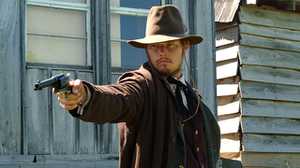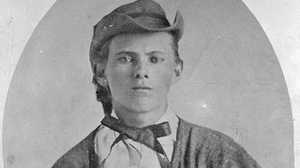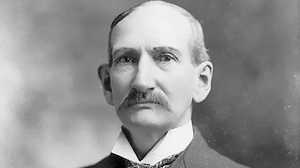Zerelda James
A hard woman in a harder time, Zerelda James was a slaveholder and unabashed supporter of the Southern cause. She lost part of an arm and a young son in a raid on her home by Pinkerton operatives, but never surrendered the belief that two of her other boys, Frank and Jesse, were Confederate heroes, not ruthless murderers.

A Farm in Little Dixie
Jesse's mother stood some six feet tall, with a forceful personality and a steely gaze. Described as "a woman of masculine will," Zerelda hailed from Kentucky slave-owning gentry, and she was only 16 when she married college student Robert James in 1841. The next spring they moved to Western Missouri, settling in an area known as "little Dixie." Zerelda and her preacher husband acquired six slaves and passed their pro-slavery views on to their children: Frank, born in 1843; Jesse, born in 1847; and Susan, born in 1849. Robert left his family for California in 1850, drawn by the gold rush, and died there of cholera after only a few months. His 25-year-old widow was left to eke out an existence, with a tenuous legal hold on her Clay County hemp farm.
Remarried
To get back on her feet Zerelda needed another husband; her first choice was a wealthy neighbor named Benjamin Simms, whom she wed in 1852. The marriage didn't take, though, and they separated within a year. Simms subsequently died in early 1854. The next year Zerelda married a timid country doctor named Reuben Samuel, a man one local termed "completely under the control of his wife." Together they acquired and sold slaves, worked the land, and had more children together. Then the Civil War ame and ripped apart the fabric of their lives.
War and Bushwhackers
Clay County contained some of Missouri's most avid Confederates, and Zerelda was no exception. She supported secession and her son Frank's decision to head off in 1861 to join a state militia that ended up fighting for the South. When regular Confederate forces were driven from the state, Frank came back home, but he set off again in May 1863 to serve with the "bushwackers, guerrillas eager to continue the war against Union soldiers and civilians alike. These activities brought the wrath of federal militiamen down on the farm, and Reuben was tortured for information on Frank's whereabouts. Zerelda was herself jailed until she signed a loyalty oath, but it did nothing to shake her sympathies; she named a daughter born that year after one of Missouri's most famous bushwhackers, William Quantrill. And when Frank and Jesse participated in the infamous massacre of unarmed soldiers at Centralia in September 1864, Zerelda expressed pride in her boys and prayed that God would protect them. A Union officer described her as "one of the worst women in this state." Union authorities banished Zerelda to Nebraska in early 1865, and she only returned after the war was over.

No Mother Ever Had Better Sons
The end of official war did not stop bushwhacker activities, and Zerelda continued supporting her boys as they transitioned into a life of crime. She provided an alibi during the Gallatin bank robbery in 1869, and later threatened a witness who linked her boys to an 1874 stagecoach robbery. Zerelda gave newspaper interviews, lying about Jesse and Frank's whereabouts and declaring, "No mother ever had better sons." But the boys she praised as "affectionate, obedient, and dutiful" had killed a Pinkerton detective, and in January 1875, the agency's founder organized a raid on Zerelda's homestead. When an incendiary device hurled into the house accidentally exploded, the blast killed Zerelda's eight-year-old son Archie and necessitated the amputation of part of her arm. The attack was a grievous blow, one of the few times in her life when Zerelda was actually shaken, but she soon recovered her composure and resumed the campaign to present the James family as innocent victims of Federal troops and Radical Republicans.
Selling Pebbles
Jesse spent the late 1870s living in Tennessee under an assumed name, but in 1879 he returned to crime with a new gang. These recruits were not ex-bushwhackers, and they lacked any deep loyalty to Jesse. One man named Dick Liddil agreed to testify against the James brothers in exchange for immunity from prosecution; the brother of another gang member ended up murdering Jesse in 1882. When Zerelda caught sight of Liddil at the coroner's inquest, her venom spilled out. "Traitor, traitor, traitor!" she shouted. "God will send vengeance on you for this." Zerelda subsequently rejected a promoter's offer of $10,000 for Jesse's body, but as time passed, the lure of money won out. She had Jesse buried in her front yard and sold pebbles from the gravesite for a quarter each.







